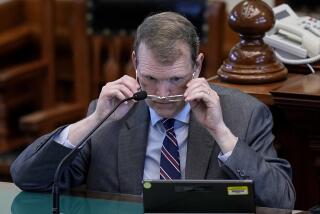Robbins Testifies About Nomination Strategy
- Share via
SACRAMENTO — Former state Sen. Alan Robbins testified Wednesday that he and lobbyist Clay Jackson in 1991 discussed persuading then-U. S. Sen. John Seymour to use his influence to derail the prospective appointment of a tough U.S. attorney who would probably prosecute Robbins.
Robbins said the strategy was discussed at a “series of meetings” between him and Jackson. At least one meeting was captured by a secret tape recorder Robbins wore after he became a prosecution witness in the long-running state Capitol corruption case.
He testified under defense questioning at the political corruption trial of Jackson, one of California’s most powerful lobbyists, and former state Sen. Paul Carpenter (D-Cypress). The trial is in its second week.
There was no indication at the federal court trial that Seymour, a Republican who had been appointed to the U. S. Senate by Gov. Pete Wilson in December, 1990, acted to thwart the appointment of George L. O’Connell as U. S. attorney for the Sacramento region.
Seymour, defeated for election last year by Democrat Dianne Feinstein, said in a telephone interview Wednesday that he and Jackson did discuss the appointment of a San Francisco superior court judge to the federal bench, but that the O’Connell nomination was never raised.
Seymour said the FBI asked him several months ago to listen to a secretly recorded conversation between Robbins and Jackson. Seymour said he believed that Jackson had taken the information regarding the judicial appointment and applied it to O’Connell in an effort to “build credibility” with Robbins.
Seymour, now director of the state Housing Finance Agency, said he was a supporter of O’Connell for the job and “worked as hard as I could to get that appointment made.”
O’Connell, a deputy federal prosecutor who had pursued Robbins in the scandal, ultimately was promoted to U. S. attorney in 1991 during the Bush Administration. He left in May when Atty. Gen. Janet Reno appointed Robert Twiss to the post.
In court on Wednesday, Robbins testified that the prospect of O’Connell being promoted to U. S. attorney “did not bode well for my future.”
Robbins said during negotiations, in which he agreed to become an informant against former colleagues in exchange for reduced prison time, O’Connell first warned him that he faced three or four years in prison but “then went to five years. It wasn’t going in a very good direction.”
“Both Mr. Jackson and I were concerned by Mr. O’Connell’s prior investigations at the Capitol,” said Robbins, who is serving a reduced two-year term.
Jackson’s attorney, Donald Heller, asked Robbins whether he had alerted Jackson that O’Connell “was coming after you and had been investigating you for a couple of years” and whether he had asked Jackson to try to intercede with Seymour.
“We most assuredly continued our discussion,” Robbins replied.
At a secretly recorded breakfast meeting in July, 1991, Robbins told Jackson that while he believed his own attorneys were “doing an excellent job of holding the government at bay,” he needed to know “what do you hear from Mr. Seymour.”
Jackson replied on the tape that he talked with Seymour a month earlier and that Seymour was “making inquiries along” unspecified lines the two had discussed previously.
Jackson said Seymour had told him that although senators were considered influential in selecting U. S. attorneys, the federal Department of Justice under Atty. Gen. Richard Thornburgh had wanted to make the appointment.
Jackson noted that the election of Seymour to the Senate in 1992 was a high priority issue with the Republican Party and indicated that he had encouraged GOP friends to contribute to Seymour’s campaign.
Times staff writer Mark Gladstone contributed to this report.
More to Read
Get the L.A. Times Politics newsletter
Deeply reported insights into legislation, politics and policy from Sacramento, Washington and beyond. In your inbox twice per week.
You may occasionally receive promotional content from the Los Angeles Times.








